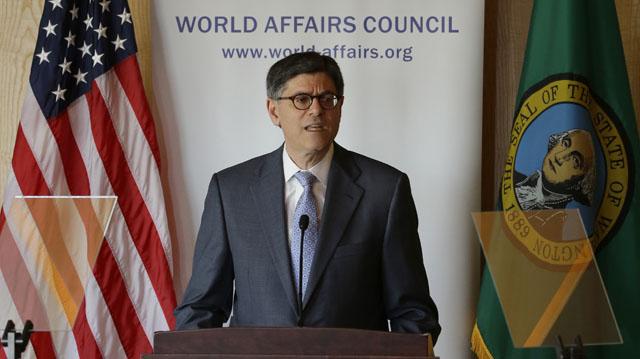You are here
US warns eurozone over deflation risk
By Agencies - Apr 10,2014 - Last updated at Apr 10,2014
WASHINGTON — US Treasury Secretary Jacob Lew warned the eurozone this week to pay heed to the risk of deflation, adding pressure on European authorities and the European Central Bank (ECB) to boost growth.
"The risk of low demand and the risk of deflation is something they need to be very alert to," Lew said on CNBC television.
Lew added that countries running strong fiscal and trade surpluses should do more to increase demand, to help deficit countries.
"In Europe as a whole, the growth rate is very modest, the risk of deflation is something that has a lot of people concerned," he said. "There is a demand problem in the world and there is a demand problem in Europe."
"There are a number of countries that could do more, and Germany obviously is one of the surplus countries in Europe," he indicated.
He suggested that more investment in infrastructure could help boost demand, in turn countering the deflationary pressures from slow growth.
Lew's warning came a day after the International Monetary Fund's (IMF) chief economist Olivier Blanchard urged the ECB to act "soon" to counter extremely low inflation, which some economist worry could reverse the euro area's rebound.
Blanchard said the ECB had studied its options already, including setting negative interest rates and embarking on a US-like quantitative easing stimulus.
"I think they should all be looked at, and I know that the ECB is looking at them," he said of the bank's various choices. "And we hope that they will implement them as soon as they are technically ready to do so."
"Everything should be done to try to avoid" deflation, he added.
According to an upgraded IMF forecast, the eurozone economy is recovering towards 1.2 per cent growth this year.
Warning that recovery in the 18 eurozone members was struggling up a slippery slope, the IMF raised the outlook for this year from 1.0 per cent, and forecast 1.5 per cent growth next year and in the medium term.
Although the eurozone had "finally emerged from recession" after a contraction of 0.5 per cent last year, "downside risks dominate", the IMF said.
The legacy of the financial and debt crises in the form of high unemployment, debt and tight credit still had to be tackled, but the recovery is underpinned by reforms already enacted, it added.
However dangers abound, notably a "relatively high risk" of deflation, which could set the recovery back, the IMF warned in its spring economic forecasts.
Countries in difficulties because of budget deficits must push ahead with economic reforms, the IMF said.
Related Articles
The United States on Wednesday stepped up calls on European policy makers to do more to avoid a "lost decade" of low growth, saying steps taken by the European Central Bank (ECB) may not be sufficient on their own.
Growth in emerging markets will slow for a fifth consecutive year, the International Monetary Fund (IMF) said Tuesday, as exchange rate swings and oil prices plunge, and China’s economic growth slows.
The United States on Wednesday renewed a warning that Europe risks falling into a downward spiral of falling wages and prices, saying recent actions by the European Central Bank (ECB) may not be enough to ward off deflation.
















